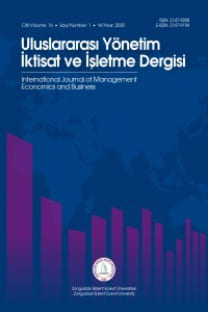BÜTÇESEL KONTROL VE ORGANİZASYONEL PERFORMANS İLİŞKİSİNDE BÜTÇE UYGULAMA STRATEJİSİ, BÜTÇE PLANLANMASI VE BÜTÇENİN ALGILANAN ÖNEMİNİN ETKİSİ
Yönetim muhasebesinde işletme kaynaklarının verimli kullanımı ve faaliyet etkinliği için yaygın bir şekilde kullanılmaktadır. Bütçelerin işletme performansına arzu edilen katkıyı sağlayabilmesi için bütçeleme süreçleri ve uygulama aşamalarındaki katılımcı davranışlarının iyi anlaşılması gerekmektedir. Bu çerçevede tasarlanan çalışmada, organizasyonel performansın belirleyicisi olarak bütçesel kontrol sistemi, bütçenin algılanan önemi, bütçesel planlama ve bütçe uygulama stratejisi arasındaki ilişkilerin incelenmesi amaçlanmıştır. Bu kapsamda çalışmada, Bursa ilinde bütçeleme süreçlerinde görev alan 175 katılımcıdan anket yoluyla elde edilen verilerin, kısmi en küçük kareli yapısal eşitlik analiziyle elde edilen sonuçlarına yer verilmiştir. Çalışmada elde edilen bulgulara göre bütçe uygulamalarının yer aldığı bütçesel kontrol ortamlarının organizasyonel performansı artıran bir etkiye sahip olduğu, bütçenin algılanan önemi ve bütçesel planlamanın ise bütçesel kontrolü artırdığı ve bu nedenle organizasyonel performans üzerinde bütçesel kontrol üzerinden dolaylı olumlu etkiye sahip etkili unsurları oluşturdukları gözlenmiştir. Çalışmada ayrıca bütçe uygulama stratejisinin bütçesel planmala ve bütçenin algılanan önemi üzerinden anlamlı bir artışa neden olan önemli bir öncül olduğu tespit edilmiştir. Bu açıdan bütçe uygulama stratejisinin bütçeye atfedilen önemin artmasını ve bütçe planlamasına zemin hazırlayarak planlama etkinliğini artırarak bütçe kontrol sistemi ve organizasyonel performansı dolaylı olarak pozitif şekilde etkilediği belirlenmiştir.
THE IMPACT OF PERCEIVED IMPORTANCE OF BUDGET AND BUDGET IMPLEMENTATION STRATEGY, BUDGET PLANNING IN THE BUDGETARY CONTROL AND ORGANIZATIONAL PERFORMANCE RELATIONSHIP
It is widely used in management accounting for efficient use of business resources and activity efficiency. In order for budgets to make the desired contribution to business performance, participatory behaviors in budgeting processes and implementation phases should be well understood. In this study, it is aimed to examine the relations between budgetary control system as determinant of organizational performance, perceived importance of budget, budgetary planning and budget implementation strategy. In this context, the results of the data obtained from the questionnaire from 175 participants who took part in the budgeting processes in Bursa province were included in the partial least squares structural equation analysis. According to the findings of the study, it has been observed that budgetary control environments in which budget applications take place have an effect that increases the organizational performance, the perceived importance of the budget and budgetary planning increase the budgetary control and therefore create effective elements that have indirect positive effects on organizational performance through budgetary control. In the study, it has also been determined that the budget implementation strategy is an important premise that causes a significant increase in budgetary planning and the perceived importance of the budget. In this respect, it has been determined that the budget execution strategy has an indirect positive effect on the budget control system and organizational performance by increasing the importance attributed to the budget and increasing the planning efficiency by preparing the basis for budget planning.
___
- Abata, M. A. (2014). Participative budgeting and managerial performance in the Nigerian food products sector. Global Journal of Contemporary Research in Accounting, Auditing and Business Ethics (GJCRA) An Online International Research Journal (ISSN: 2311-3162),1(3).
